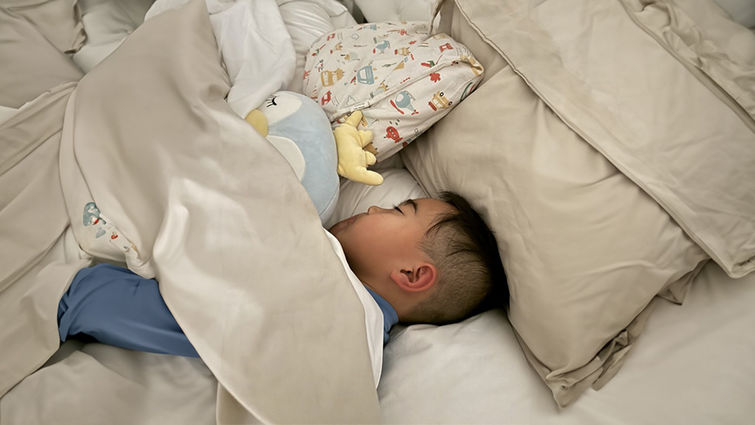
Sleep plays a fundamental role in a child's physical and mental development, yet many children are not getting the rest they need. From improving memory and focus to strengthening the immune system, quality sleep impacts nearly every aspect of a child's growth. Sunitha Nune, MD, a pediatric sleep specialist at Loma Linda University Children’s Hospital, explains why sleep is vital for children, how much they need at different ages, and what parents can do to establish healthy sleep habits.
Why is sleep so important for children’s brain development and overall health?
Sleep is essential for a child’s brain and body to rest, recover, and grow. It supports memory consolidation, mood regulation, and the production of hormones critical for brain and body development. During sleep, the body strengthens the immune system, and helps fight off infections, keeping children healthy.
How does sleep impact a child’s ability to learn, focus, and regulate emotions?
Lack of sleep negatively affects memory, making it harder for children to retain and process new information. It can also cause irritability, mood swings, and emotional instability. Studies show that even one night of insufficient sleep can impact memory, behavior, and mood. In some cases, chronic sleep deprivation can mimic symptoms of mood disorders, leading to emotional dysregulation.
How much sleep should children be getting at different ages?
According to the American Academy of Sleep Medicine
- Infants (4-12 months): 12-16 hours (including naps)
- Toddlers (1-2 years): 11-14 hours (including naps)
- Preschoolers (3-5 years): 10-13 hours (including naps)
- School-age children (6-12 years): 9-12 hours
- Teenagers (13-18 years): 8-10 hours
What are some key elements of a healthy bedtime routine?
A consistent bedtime routine helps signal the body that it’s time to sleep.
- Avoiding screens, exercise, and stimulating activities at least an hour before bed
- Keeping a regular sleep schedule, even on weekends
- Creating a calm and relaxing pre-bedtime routine, such as reading or listening to soft music
- Using the bed only for sleep to reinforce sleep associations
How can parents help their child transition from daytime activities to bedtime more smoothly?
Establish a set bedtime based on the child’s sleep needs. Begin the wind-down routine one hour before bedtime. Encourage children to plan, prepare, and pack for the next day, starting in shared spaces like the kitchen and living room before moving to the bathroom and finally the bedroom. Spend time with your child to help them decompress. This can include talking about their day, addressing any stressors, cuddling, reading together, or engaging in other calming activities that promote relaxation. Avoiding screen time at least one hour before bed can also be highly beneficial for improving sleep quality.
What are some common sleep disorders in children, and how can they be addressed?
Some common sleep disorders in children include behavioral insomnia, where a child struggles to fall asleep independently, as well as snoring or restless sleep, which may indicate conditions such as sleep apnea or restless leg syndrome. If you have concerns about your child's sleep quality, difficulty falling asleep, or staying asleep, consult a pediatrician for a referral to a sleep specialist.
How can parents help kids who struggle with falling or staying asleep?
Parents can help by first recognizing that sleep difficulties may be behavioral and gradually implementing changes to encourage independent sleep. If these adjustments do not improve the situation, seeking an evaluation for a potential sleep disorder may be beneficial.
What are the signs that a child might have an underlying sleep issue that needs medical attention?
- Loud snoring, gasping, or pauses in breathing during sleep
- Frequent nighttime awakenings or excessive movement during sleep
- Waking up tired despite getting an adequate amount of sleep
- Daytime sleepiness, difficulty focusing, or behavioral issues
How do screens and digital devices impact sleep quality in children?
Screen exposure before bed disrupts sleep by reducing melatonin production, the hormone responsible for making the brain and body feel sleepy. The blue light from screens delays the body’s natural sleep cycle, making it harder for children to fall asleep and get restful sleep.
How do diet, exercise, and daily activities affect sleep in kids?
A balanced diet rich in essential nutrients supports healthy sleep, while consuming caffeine, spicy foods, or high-sugar snacks can lead to restlessness. Regular physical activity promotes better sleep, but engaging in vigorous exercise too close to bedtime may delay sleep onset. Maintaining a consistent daily routine, including a set bedtime and wake-up time, helps regulate the body's internal clock, making it easier for children to fall and stay asleep.
What should parents do if their child constantly wakes up at night?
If a child frequently wakes up at night and struggles to fall back asleep, parents should assess whether the cause is behavioral or medical. A behavioral cause may be that the child relies on a parent to fall asleep. In this case, gradually encouraging independent sleep habits can be beneficial. If there is no clear reason for the sleep disruption, it may indicate an underlying medical condition, such as sleep apnea. In such cases, consulting a pediatrician for further evaluation is recommended.
Are naps beneficial for children? Is there a certain age naps that should be phased out?
Infants and toddlers require regular naps throughout the day. Preschoolers may still benefit from naps but often transition to quiet rest time as they grow. For school-age children, naps are typically phased out; however, a short 30-minute nap after school can help refresh them without interfering with bedtime.
